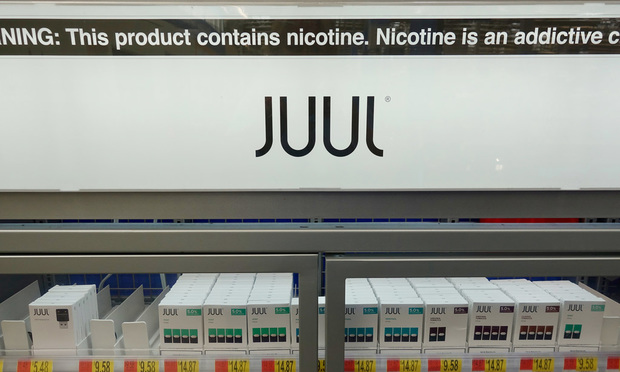Connecticut AG Investigates Juul Over Alleged Smoking-Cessation Claims Using E-Cigarettes
"Juul has never been approved as an effective smoking cessation device," Connecticut Attorney General William Tong said.
July 31, 2019 at 03:58 PM
4 minute read
 Juul brand e-cigarettes in a case at a retail store. Photo: Joni Hanebutt/Shutterstock.com
Juul brand e-cigarettes in a case at a retail store. Photo: Joni Hanebutt/Shutterstock.com
Juul Labs Inc., a San Francisco-based company facing several lawsuits from across the country and who U.S. Surgeon General Jerome Adams in December singled out when saying vaping could lead to lifelong addiction, is now facing a joint investigation by the Office of Connecticut Attorney General William Tong and the state Department of Consumer Protection.
The thrust of the probe is to determine whether Juul’s marketing and sales practices were proper, including claims that Juul helps smokers quit smoking and that’s is a smoking cessation tool, despite lack of FDA approval.
Juul Labs, founded in 2017, is an arm of cigarette manufacturer Altria Group Inc. and its subsidiary, Philip Morris USA Inc.
Tong joined DCP Commissioner Michelle Seagull and several state health officials Wednesday morning for a press conference to outline the investigation into Juul’s health claims.
“Juul has never been approved as an effective smoking cessation device. In fact, there is mounting evidence to the contrary,” Tong said in a statement. “We will not prejudge the outcome of this investigation, but stand ready to act to protect public health should we uncover any violation of law.”
In 2018, according to Tong’s office, Juul launched an “enterprise markets team,” tasked with forming new agreements with health plans, health providers, employers and the public sector.
Now, Tong’s office said Connecticut authorities will seek information about the team and its work. Investigators will examine the formation of the team, its marketing materials, and the information it disseminated about the e-cigaratte’s effectiveness as a cessation tool for adult smokers.
The investigation will also seek information on how Juul selects it target-market groups, and any measures the company has taken to limit its targeted marketing to current smokers over the age of 21.
Juul spokesman Ted Kwong said the company never intended its e-cigarettes to be a tool for users looking to quit smoking.
“To be clear: the JUUL system is a switching product designed to help adult smokers switch from combustible cigarettes to an alternative nicotine delivery and that is how we position it in our marketing and communications,” Kwong said. “JUUL products are not intended to be used as cessation products, including for the cure or treatment of nicotine addiction, relapse prevention, or relief of nicotine withdrawal symptoms. We look forward to a productive dialogue as we continue to combat youth usage and help adult smokers switch from combustible cigarettes.”
He also suggested the company did not target underage users.
“We share the attorney general’s concerns about youth vaping, which is why we welcome the opportunity to share information about our commitment to eliminate combustible cigarettes and our aggressive, industry-leading actions to combat youth usage,” Kwong said. “We strongly advocate for Tobacco 21 legislation nationwide, we stopped the sale of nontobacco and nonmenthol-based flavored JUULPods to our traditional retail store partners, enhanced our online age-verification process, strengthened our retailer compliance program with over 2,000 secret-shopper visits per month, and shut down our Facebook and Instagram accounts while working constantly to remove inappropriate social media content generated by others on those platforms. And we continue to develop technologies to further restrict underage access.”
But Tong seems unconvinced.
“It appears they have targeted minors in the past,” he said. “The whole system of flavors, like bubble gum and cotton candy, appear to be directed at young people. There was also an advertising campaign through social media and YouTube with images that appealed to young people, and messages that appealed to young people. This appears to be the short, but very active, history of this company.”
Juul has made national news in recent months. According to the Hartford Courant, a new study from Yale University published Tuesday found previously unknown risks in electronic cigarette liquids.
And in December the U.S. surgeon general warned the public that vaping could harm brain development and damage the lungs.
“We need to protect our kids from all tobacco products, including all shapes and sizes of e-cigarettes,” he said at that time.
Then in July, the Daily Business Review, an ALM affiliate of the Connecticut Law Tribune, reported a South Florida attorney had asked a federal judge to halt the sale of Juul’s e-cigarettes nationwide. The motion alleges the company never sought FDA approval to sell its electronic nicotine devices, as the Tobacco Control Act requires.
Read More:
Broward Lawyer Sparks Class Action to Ban Sale of Juul E-Cigarettes
This content has been archived. It is available through our partners, LexisNexis® and Bloomberg Law.
To view this content, please continue to their sites.
Not a Lexis Subscriber?
Subscribe Now
Not a Bloomberg Law Subscriber?
Subscribe Now
NOT FOR REPRINT
© 2025 ALM Global, LLC, All Rights Reserved. Request academic re-use from www.copyright.com. All other uses, submit a request to [email protected]. For more information visit Asset & Logo Licensing.
You Might Like
View All
'Battle of the Experts': Bridgeport Jury Awards Defense Verdict to Stamford Hospital
3 minute read
Settlement Allows Spouses of U.S. Citizens to Reopen Removal Proceedings
4 minute read
Judge Awards Over $350K in Attorney Fees in Data Breach Class Action Settlement
3 minute read
Silk Road Founder Ross Ulbricht Has New York Sentence Pardoned by Trump
3 minute readTrending Stories
- 1US Judge Dismisses Lawsuit Brought Under NYC Gender Violence Law, Ruling Claims Barred Under State Measure
- 24th Circuit Upholds Virginia Law Restricting Online Court Records Access
- 3Lawsuit Against Major Food Brands Could Be Sign of Emerging Litigation Over Processed Foods
- 4Fellows LaBriola LLP is Pleased to Announce that Alisha Goel Has Become Associated with The Firm
- 5Law Firms Turn to 'Golden Handcuffs' to Rein In Partner Movement
Who Got The Work
J. Brugh Lower of Gibbons has entered an appearance for industrial equipment supplier Devco Corporation in a pending trademark infringement lawsuit. The suit, accusing the defendant of selling knock-off Graco products, was filed Dec. 18 in New Jersey District Court by Rivkin Radler on behalf of Graco Inc. and Graco Minnesota. The case, assigned to U.S. District Judge Zahid N. Quraishi, is 3:24-cv-11294, Graco Inc. et al v. Devco Corporation.
Who Got The Work
Rebecca Maller-Stein and Kent A. Yalowitz of Arnold & Porter Kaye Scholer have entered their appearances for Hanaco Venture Capital and its executives, Lior Prosor and David Frankel, in a pending securities lawsuit. The action, filed on Dec. 24 in New York Southern District Court by Zell, Aron & Co. on behalf of Goldeneye Advisors, accuses the defendants of negligently and fraudulently managing the plaintiff's $1 million investment. The case, assigned to U.S. District Judge Vernon S. Broderick, is 1:24-cv-09918, Goldeneye Advisors, LLC v. Hanaco Venture Capital, Ltd. et al.
Who Got The Work
Attorneys from A&O Shearman has stepped in as defense counsel for Toronto-Dominion Bank and other defendants in a pending securities class action. The suit, filed Dec. 11 in New York Southern District Court by Bleichmar Fonti & Auld, accuses the defendants of concealing the bank's 'pervasive' deficiencies in regards to its compliance with the Bank Secrecy Act and the quality of its anti-money laundering controls. The case, assigned to U.S. District Judge Arun Subramanian, is 1:24-cv-09445, Gonzalez v. The Toronto-Dominion Bank et al.
Who Got The Work
Crown Castle International, a Pennsylvania company providing shared communications infrastructure, has turned to Luke D. Wolf of Gordon Rees Scully Mansukhani to fend off a pending breach-of-contract lawsuit. The court action, filed Nov. 25 in Michigan Eastern District Court by Hooper Hathaway PC on behalf of The Town Residences LLC, accuses Crown Castle of failing to transfer approximately $30,000 in utility payments from T-Mobile in breach of a roof-top lease and assignment agreement. The case, assigned to U.S. District Judge Susan K. Declercq, is 2:24-cv-13131, The Town Residences LLC v. T-Mobile US, Inc. et al.
Who Got The Work
Wilfred P. Coronato and Daniel M. Schwartz of McCarter & English have stepped in as defense counsel to Electrolux Home Products Inc. in a pending product liability lawsuit. The court action, filed Nov. 26 in New York Eastern District Court by Poulos Lopiccolo PC and Nagel Rice LLP on behalf of David Stern, alleges that the defendant's refrigerators’ drawers and shelving repeatedly break and fall apart within months after purchase. The case, assigned to U.S. District Judge Joan M. Azrack, is 2:24-cv-08204, Stern v. Electrolux Home Products, Inc.
Featured Firms
Law Offices of Gary Martin Hays & Associates, P.C.
(470) 294-1674
Law Offices of Mark E. Salomone
(857) 444-6468
Smith & Hassler
(713) 739-1250










